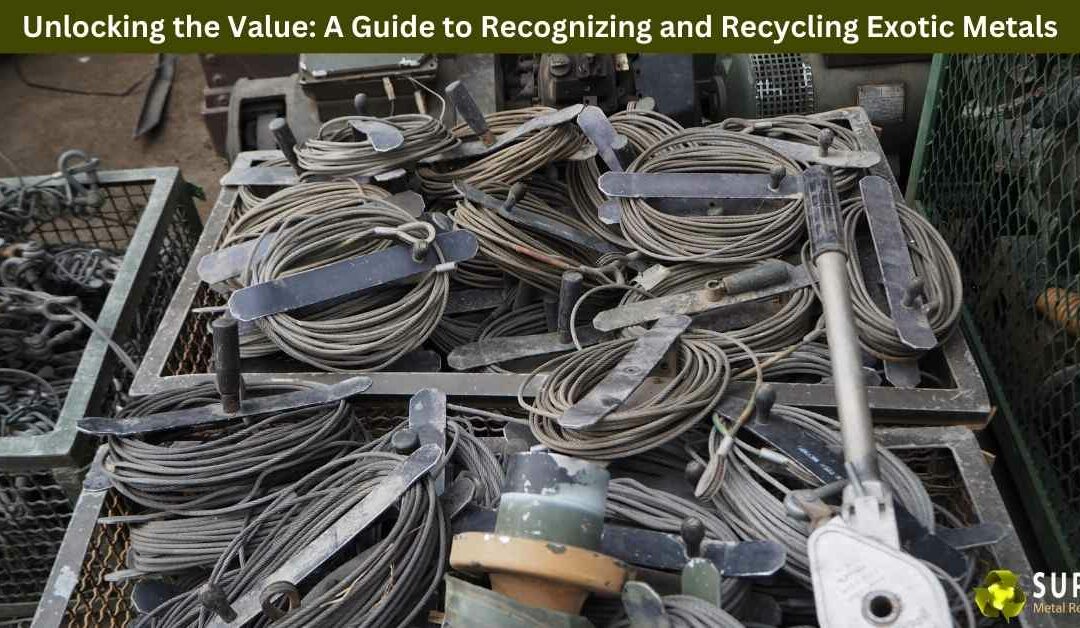As the demand for sustainable practices continues to rise, the recycling industry is expanding its focus to include exotic metals. These unique materials, often found in specialized applications, possess valuable properties that make them crucial in various industries. This article serves as a guide to recognizing and recycling exotic metals, offering insights into their significance, identification, and the environmentally responsible methods of extracting their inherent value.
Understanding Exotic Metals
Exotic metals encompass a diverse range of materials with unique properties, including but not limited to titanium, cobalt, tantalum, and rare earth elements. These metals are often characterized by their exceptional strength, corrosion resistance, and heat resistance, making them integral components in aerospace, medical devices, electronics, and renewable energy technologies. Recognizing the distinct properties and applications of exotic metals is the first step in unlocking their recycling potential.
Identifying Exotic Metals in Scrap Streams
Proper identification of exotic metals within scrap streams is crucial for effective recycling. Utilize advanced analytical techniques, such as X-ray fluorescence (XRF) and inductively coupled plasma mass spectrometry (ICP-MS), to accurately determine the composition of scrap materials. Additionally, collaborate with suppliers, manufacturers, and industry experts to stay informed about the presence of exotic metals in various waste streams.
Establishing Specialized Sorting Processes
Due to the unique properties of exotic metals, traditional sorting methods may not be sufficient. Develop specialized sorting processes that cater specifically to the characteristics of each exotic metal. Implementing advanced sorting technologies, including optical sorting and electromagnetic separators, enhances the precision of separating different exotic metals from mixed scrap, optimizing the recycling process.
Investing in Advanced Recycling Technologies
The recycling of exotic metals often requires advanced technologies to extract their value efficiently. Pyrometallurgical and hydrometallurgical processes, such as smelting and leaching, are commonly employed for the recovery of exotic metals from scrap. Investing in state-of-the-art recycling technologies ensures a high yield and minimizes environmental impact, aligning with the broader goals of sustainable resource management.
Collaborating with Industry Stakeholders
Building collaborative relationships with industry stakeholders is essential for successful exotic metal recycling. Engage with manufacturers, research institutions, and government bodies to stay abreast of technological advancements, regulatory changes, and emerging opportunities in the exotic metal recycling landscape. Collaborative efforts facilitate knowledge exchange and foster an ecosystem that supports the responsible recycling of these valuable materials.
Environmental and Economic Benefits
Recycling exotic metals not only conserves valuable resources but also offers significant environmental and economic benefits. By diverting exotic metals from landfills and reducing the need for primary extraction, the recycling process minimizes the environmental impact associated with mining and processing. Simultaneously, businesses can capitalize on the economic value of recycled exotic metals, contributing to a more sustainable and profitable operation.
Raising Awareness and Education
Raising awareness about the importance of recognizing and recycling exotic metals is vital for fostering a culture of responsible resource management. Educate stakeholders, including employees, suppliers, and the general public, about the significance of these materials and the positive environmental impact of recycling them. Increased awareness contributes to a collective effort towards sustainable practices in the recycling industry.
Recognizing and recycling exotic metals present both challenges and opportunities in the dynamic landscape of the recycling industry. By understanding the unique properties of exotic metals, implementing specialized sorting processes, investing in advanced recycling technologies, collaborating with industry stakeholders, and raising awareness, businesses can unlock the intrinsic value of these materials while contributing to a more sustainable and environmentally conscious future. As the demand for exotic metals continues to grow, responsible recycling practices will play a crucial role in meeting this demand while minimizing the environmental impact of their extraction and production.
If you are in Berwick, Victoria 3806, and looking for a metal recycling service, this is the best way to visit us.
345 Frankston – Dandenong Road, Dandenong South VIC 3175
(03) 9706 4909


Recent Comments